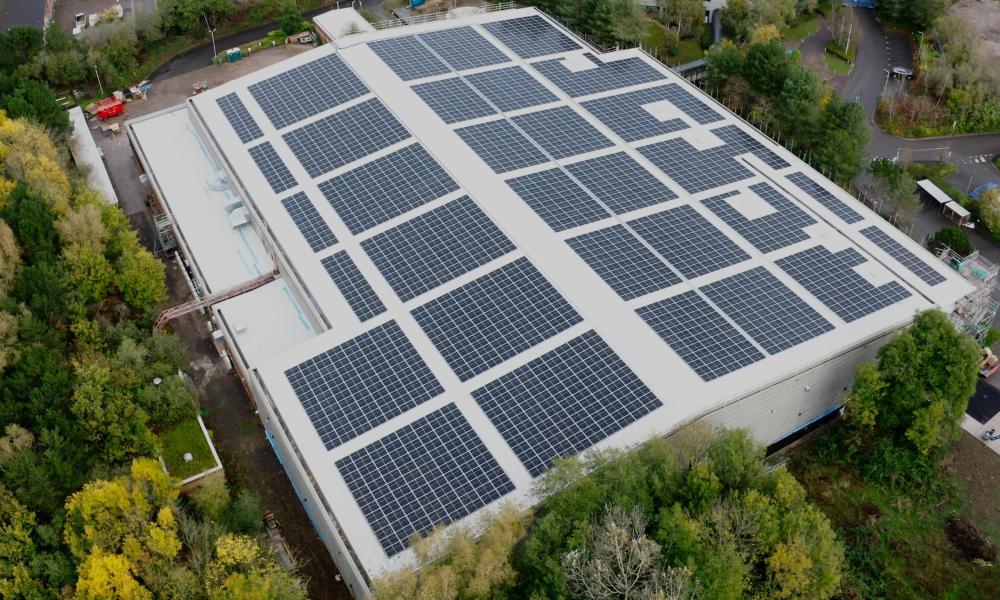
We’re delighted to share that our expansion facility TBY2 is one of the first studios to be awarded the new Studio Sustainability Standard by BAFTA albert, the UK’s industry organisation for environmental sustainability in TV in film.
TBY2 is The Bottle Yard’s new £12m sustainably-designed film and TV production facility, powered by a 1MWp rooftop solar array, believed to be the largest community-owned rooftop array in the UK and the biggest rooftop PV system in the UK studios sector.
TBY2 was the second-highest scoring studio of the 12 participants in the first cohort for the new Studio Sustainability Standard. It is one of five studios that received a ‘Very Good’ rating, the highest grade achieved in the group.
Launched in 2022, the global, voluntary scheme was designed by BAFTA albert alongside global engineering and consulting firm Arup, to help studios measure and reduce the environmental impact of their facilities. All participating studios commit to making year-on-year improvements to their sustainability going forward.
Laura Aviles, Senior Film Manager (Bristol City Council), says: “We’re extremely proud that The Bottle Yard’s TBY2 facility has received its Studio Sustainability Standard. Coming second in class is also very rewarding considering the high calibre of participants. By placing sustainability at the heart of our expansion and working with Bristol Energy Cooperative and Bristol Council’s Energy Services team, we were able to achieve our ambitious vision of a state-of-the-art, solar-powered studio.
“The exciting thing about the community ownership model is that it is entirely replicable and brings direct benefits to the local area as well as our production clients. We hope TBY2 will inspire other projects and will be happy to share knowledge with others in the UK film industry and beyond. We look forward to continuing to improve studio sustainability across our sites going forward.”
Carys Taylor, Director of BAFTA albert, said “The expertise and quality of UK studios make them among the most in-demand in the world. Now, as participants in the albert Studio Sustainability Standard, they’re on a path to being the most sustainable in the world too. The release of the new Studio Sustainability Standard ratings badges will allow studios to show off the progress they’ve already made and benchmark the progress yet to come. And productions will know where to go to get support for their own sustainability missions.”
Steve Smith, Project Lead for the Studio Sustainability Standard said, “Congratulations to all the studios who have participated in the first year of the Studio Sustainability Standard. You are part of an elite group of 12 studios demonstrating your commitment to tackling the climate emergency by getting to Net Zero as quickly as possible. It’s been inspiring to see so many initiatives already under way to help make the screen sector a zero carbon, zero waste industry. At albert, we look forward to supporting you on your net zero journeys and we hope other studios will see the value of joining the standard this year.”
Councillor Kye Dudd, Bristol City Council Cabinet Member for Climate, Ecology, Waste and Energy, said: “Receiving this standard is a great accolade for the new TBY2 facility. The rating is a major endorsement of the journey we are on to deliver Bristol’s 2030 carbon neutral ambition and the approach we are taking to tackle the climate and ecological emergencies in partnership with the community.”
TBY2 is also nominated for a 2023 Global Production Award in the Sustainability Initiative category. Winners will be announced on 22 May at an awards ceremony taking place at Cannes Film Festival.

Consisting of more than 2,300 panels, TBY2’s solar array was part-funded by community-owned enterprise Bristol Energy Cooperative (BEC) and is capable of generating enough energy to power more than 250 average households per year. Bristol City Council initially planned to install a 283kWp solar array on the new expansion facility, but thanks to funding from BEC, the final array was three times larger than originally planned.
Energy produced at TBY2 will power the facility and over time, surplus energy will be utilised through the Bristol City Leap Sleeved Pool electricity supply model, which connects buildings and ‘sleeves’ energy generated from one to another, reducing energy consumption from non-renewables.
BEC’s community ownership model provides a return to its investor members, whilst surplus revenues go back to the local community through grants and investment into more local energy projects. BEC’s current share offer is open until 17 July 2023 and aims to raise a further £1 million to fund more ambitious rooftop solar installations.
Read more about TBY2 here.
